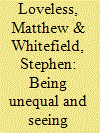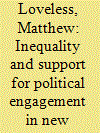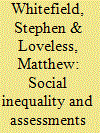| Srl | Item |
| 1 |
ID:
102575


|
|
|
|
|
| Publication |
2011.
|
| Summary/Abstract |
Market economies inevitably generate social inequalities, of which the new democracies of Central and East European (CEE) societies have seen dramatic - though widely diverging - levels of growth. Do CEE citizens believe that inequality is excessive and, if so, why? And what is the connection between perceptions of social inequality and citizens' views of new markets and democracy? These questions are addressed using new data from mass surveys conducted in 2007 in 12 post-communist CEE states. Surprisingly weak links are found between social inequality perceptions and national-level measures of inequality as well economic, social and political conditions. Perceptions of social inequality are mainly driven by individual-level assessments of market and democratic performance, but not by market or democratic ideals.
|
|
|
|
|
|
|
|
|
|
|
|
|
|
|
|
| 2 |
ID:
147051


|
|
|
|
|
| Summary/Abstract |
Existing studies of income inequality and political participation—including related literature, for example, on preferences for redistribution—leave us with the question of whether citizens see political democracy as offering ways to challenge market inequalities. Using original surveys in 13 Central and Eastern European countries, I find that those who see high and undesirable levels of income inequality have stronger demands for popular democratic participation than those who do not. In addition, neither the aggregate levels of support for political engagement nor individuals’ perceptions of inequality are coordinated with either national-level indicators of income inequality or democratic performance.
|
|
|
|
|
|
|
|
|
|
|
|
|
|
|
|
| 3 |
ID:
118427


|
|
|
|
|
| Publication |
2013.
|
| Summary/Abstract |
Considerable comparative scholarly attention has been paid to various aspects of mass support for democracy and the market. However, despite strong theoretical suggestions of a linkage, little is known about the impact of social inequality on this support. We address this issue using evidence from mass surveys undertaken in 12 post-communist states in 2007, supplemented by country-level data about economic and political performance. Specifically, we investigate whether social inequality generates negative perceptions that democracy and the market will lead to social conflict and if it increases support for anti-democratic forms of governance. Notably, we find little link between citizens' expectations of social conflict and national-level indices of income inequality. However, we do find a link between perceptions of the extent of social inequality and expectations of market-generated-but not democracy-generated-conflict. Underscoring these positive and negative findings, perceptions of social inequality are also clearly consequential for support for 'strong-hand' economic government but not for anti-democratic leadership.
|
|
|
|
|
|
|
|
|
|
|
|
|
|
|
|